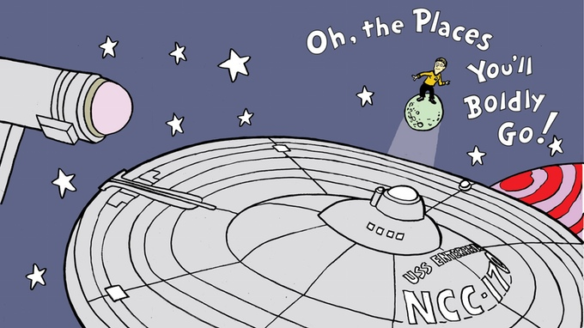
On Monday a panel of Ninth Circuit Court of Appeals judges heard oral arguments in Dr. Seuss Enterprises’ suit to stop ComicMix’s Oh, The Places You’ll Boldly Go! project.
Dr. Seuss Enterprises (DSE) claims the crowdfunded book, featuring the writing of David Gerrold and the art of Ty Templeton, infringes their copyright and trademark for Dr. Seuss’ Oh the Places You’ll Go! Previous District Court rulings had disposed of DSE’s trademark violation claims and copyright infringement claims, the latter decision now under appeal to the Ninth Circuit.
Courthouse News, in “Seuss-Star Trek Copyright Battleship Makes Landing at Ninth Circuit”, reports attorney Stanley Panikowski, representing Dr. Seuss Enterprises, said the Trek mashup would damage the demand for the Seuss original by competing with it in the graduation gift market. The mashup’s effect upon the potential market for or value of the copyrighted work is one of the four factors to be considered by the courts in evaluating fair use of copyrighted maerial.
Panikowski said via videoconference Monday… “‘Boldly’ has the same purpose, the same target audience, the same intended sales channels, and even the same substantive message as ‘Go.’ ‘Boldly is just a Star Trek-flavored clone of ‘Go,’” he added.
The Seuss classic reportedly “shoots to The New York Times’ bestsellers list” every May, purchased as a gift for graduates embarking on their careers.
In The Hollywood Reporter, “Appeals Court Reviews ‘Star Trek’/Dr. Seuss Mashup”, Eriq Gardner further observed:
If there’s reason to believe the Ninth Circuit is primed to reverse the decision and revive this mashup case, it comes from a point pushed by appellate judge Milan Smith. Several times during oral arguments, he stressed that the burden of showing a fair use is on the defendant. Meaning, it is ComicMix’s burden to show there isn’t market damage from Boldly rather than DSE’s burden to show there is the potential for market damage. Booth asserted the burden should be on the plaintiff, but in response to a question from Smith, the attorney admitted there’s no precedent of burden shifting when the judge rules the work is transformative.
Courthouse News reported another judge’s questions indicated skepticism that the mashup satisfies the copyright law’s requirements for protection as a transformative work.
When U.S. Circuit Judge M. Margaret McKeown, a Bill Clinton appointee, noted there is no bright-line rule for the court to determine if a work complies with the transformative use provision allowable by the Copyright Act, Panikowski said the work was not transformative because it did not criticize or comment on the substance and style of the Dr. Seuss original.
ComicMix attorney Dan Booth disagreed.
“‘Oh, the Places You’ll Boldly Go’ is a creative expressive work that poses no cognizable harm to Dr. Seuss Enterprises,” Booth said.
“Fair use matters to artists and the public because it gives them breathing room to create,” he added.
But McKeown countered that argument, saying: “I’m having a hard time understanding your argument that this is a parody.”
Booth said because “Oh, the Places You’ll Go” is a book heavy on illustrations, rather than text, the parody of the Star Trek mash-up “is much more implicit through the illustration than the text.”
He also argued there is a “different undercurrent” of “Oh, the Places You’ll Boldly Go,” in which its parody is in “constantly pointing out the individualistic and narcissistic character of ‘Oh, the Places You’ll Go.’”
“It’s a universalist theme as opposed to aspiring for the goals of one individual. Star Trek and ‘Boldly’ take on a different approach and shoot for a different ideal, an ideal of universalism, of group support, of communion rather than individuality,” Booth added.
McKeown appeared unconvinced, calling Booth’s argument an “after-the-fact justification” as to why ComicMix chose to parody Dr. Seuss.
She also poked holes in Sammartino’s finding the Star Trek parody was transformative under the Copyright Act.
“The district court’s opinion on fair use is if you take an existing expression and intersperse it with some new expression that all of a sudden you have a transformative work,” McKeown said.
“It would seem to me to sink the whole notion of copyright protection and almost everything would be fair use,” she added.
According to The Hollywood Reporter’s Eriq Gardner, this case “marks the first time that an appeals court has grappled with the genre of mashups.”
An attempt to place mashups on par with parody in terms of copyright law didn’t sit well with Ninth Circuit Judge M. Margaret McKeown.
“The district court seemed to take the position that if you take existing expression and then you interspersed it with new expression, you have a transformative work,” she commented. “That is a definition of transformative use that I haven’t seen before. It would seem to sting the notion of copyright protection, and almost everything would be a fair use.”
[Thanks to Michael J. Walsh for the story.]
Discover more from File 770
Subscribe to get the latest posts to your email.
